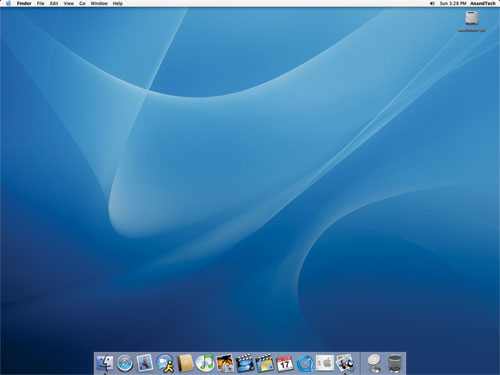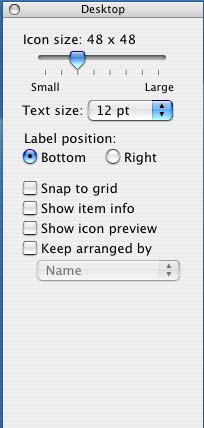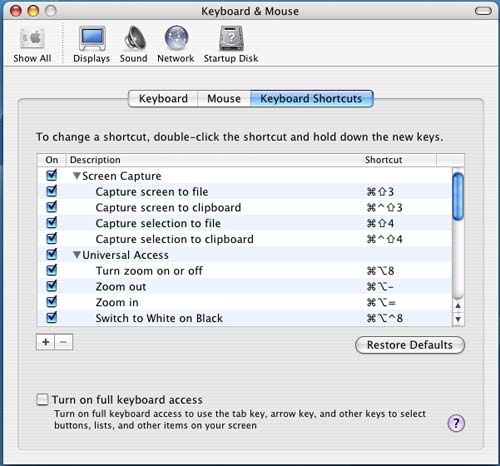A Month with a Mac: A Die-Hard PC User's Perspective
by Anand Lal Shimpi on October 8, 2004 12:05 AM EST- Posted in
- Mac
Finding my way around Finder
The OS X desktop is clearly different from what I was used to under XP. For starters, all of the icons have been moved to the right side of the screen; and where I was used to seeing a taskbar, there was this little translucent "dock" with a bunch of icons in it.
The OS X desktop and features, such as icon size, dock size and animations, are easily customizable.
Click to enlarge.
Under Windows, there is Explorer. It is the application that not only exists as a way of browsing your file system, but also as the "desktop" itself; the OS X equivalent? Finder. I don't think that I have to point out the similarity in the names. Yes, one company copied (or poked fun at) another.
My first reaction was that the icons on the desktop were far too large; indeed, they are, if you put them on a Windows desktop - but for some reason, they end up looking strange if you make them smaller. One of the biggest features of OS X is the ability to customize just about every aspect of the OS; I didn't like the size of the icons at first, so I simply changed the icon size through the "view options" menu. Although it's easy to talk about now, I had to ask how to do it online before I ever discovered the option - also the case with the majority of OS X, most of the power and customization of the OS remains hidden. I quickly realized that although Apple had targeted the entry level computer user with the interface of OS X, the OS was far more tailored to the power user in my opinion.

Where to start? Customization is much more possible (and easy to do) under OS X than any variant of Windows that I have ever encountered. Icon sizes are just the beginning; through the view options menu alone, you can change the positioning of the labels on the icons, the text size as well as the normal array of Windows options. And any changes you make here occur in real time - no clicking "OK" or "Apply". Just check a box and it happens instantaneously; and uncheck it, and everything goes back to normal. It's a small thing, but as I soon found out, much of OS X's appeal to me came in tiny gems like this.
The other thing to point out, which is quite possibly the biggest draw to OS X for me, is the fact that just about everything under OS X has a keyboard shortcut associated with it. I've found that if you got your start with PCs in the DOS days, then you end up being much more of a keyboard junkie than someone who is reliant on the mouse. I use the mouse when I have to, but when it's quicker to use the keyboard, I feel much more comfortable firing off a few keystroke combinations to get my point across. If you are anything like me in that respect, then OS X will be your playground.
I can't possibly list all of the keystroke combinations that I use on a daily basis, but there are quite a few. For example, I am a big "ALT-TAB"-er in Windows, but ALT-TAB is only really useful for switching applications, not closing them. The ALT-TAB equivalent under OS X, Command-TAB (the Command key is positioned where you'd expect ALT to be, so it works out fine), works similarly, but here's the catch - hit "Q" while you've selected an application and it will quit automatically. Nice, but nothing major right?
Want to minimize a window? Command-M will take care of that. Want to hide an application without minimizing it? Command-H. Hidden windows will automatically move to the end of the Command-TAB list, so you don't switch to them after you've hidden them.
Want to open a new Finder window? Command-N. Want to create a new folder on your drive? Shift-Command-N. I've always wanted to be able to create new folders in Explorer without using the mouse. OS X was a dream come true in that respect.
OS X will even let you define your own keyboard shortcuts for any application through the keyboard preferences panel:

Not impressed? Not a keyboard junkie? Then Finder is just as capable and as usable as Explorer. No big win for Apple there, but maybe a draw. For me, the little things are what intrigued me, but I'll admit - not everyone is as easily amused!
There is one aspect of the keyboard shortcut support that OS X does fall behind on, and that is support for keyboard shortcuts in dialog boxes. In some dialog boxes, hitting Command and the letter of the option you want to select will work, but in others, it will not. Furthermore, finding out the correct key to hit to select the option that you want is most definitely a guessing game, as there are no underlined characters or anything indicating what key to hit. Given OS X's strong support for keyboard shortcuts, this shortcoming (no pun intended) is puzzling.










215 Comments
View All Comments
gankaku - Saturday, October 9, 2004 - link
#91: dmr9748: "Now, if a MAC worksation costs 2400 to 3000 dollars, I would hate to get a quote on a server."Truth to tell: You would save money, if you bought Apple Xserves. Similar server offerings from the big boys like Dell and HP simply cost more. The following is just one of several links I could send you to.
http://www.computerworld.com/softwaretopics/os/mac...
Lwood - Saturday, October 9, 2004 - link
Thumbs up for this great article!Unfortunately, these "diehard A-user tries B"-articles always result in some kind of A-vs.-B flamewar. :-(
Both PC and Mac each have their advantages and shortcommings - just pick the system that works best for you instead of flaming. Period.
I have been a PC user since the days of the 8086, but the first notebook I have bought was in fact an Apple iBook.
This decision was made mostly for two resons:
I needed a notebook with decent battery life, and at the time (pre-Pentium-M) the PC offerings were seriously lacking in this respect.
Also, the notebook needed to run some kind of UNIX-ish OS perfectly. Even today, Linux on notebooks involves too much gambling for my taste, so I went with Mac OS X.
A pleasant side-effect was that I could use Logic 6, which is only available for Macs.
While I am personally quite pleased with my iBook, I doubt that Apple will gain a major marketshare in the years to come.
I think the main reasons for this are high pricetags combined with an obstinate refusal to sell default configurations with suitable GPUs and RAM ammount.
This just does not make sense (even much less than the 1-button-mouse), especially when you consider that Mac OS X puts quite a heavy load on the GPU, compared to other operating systems.
Steve, wake up!
It's easy to demo Tiger's fantastic GPU effects with a GF 6800 and gigabytes of RAM, but it's just as easy to scare away potential customers by offering truly moronic hardware configurations at high prices.
GTMan - Saturday, October 9, 2004 - link
Did the performance in Office improve after switching to the 9800 (ie. the slow response to bolding)? What about the Exposé performance?The OS X display is completely PostScript since OS X is basically an updated version of NeXTStep. So the video card's ability to quickly render postscript would have a huge impact on operations involving updating screen graphics.
In comparison to the PC where office applications will run fine on any cheap video card I think an OS X machine's performance even in office applications will probably very quite a bit depending on the video card. Just a guess though.
xype - Saturday, October 9, 2004 - link
I agree that Anand might have missed a few details, but the article was well balanced and well written. I do believe we can expect more Mac articles from Anandtech and it only shows that those in "the industry" are taking Macs serious again. That's way more than one could expect when OS 9 was around and it's nice to see someone with an open mind approaching the issue.I am looking forward to a review of 10.4 and some shorter articles on tinkering with Apple hardware. And, hey, even if the articles only makes a few of the high-end PC users consider going into the Apple store near them and have a look, it did more than any pro-Mac or pro-PC article did.
In an industry changing as fast as the computer one, keeping an open mind is essential and Anandtech helps users a lot there. Kudos.
dmr9748 - Saturday, October 9, 2004 - link
Ok. I have read to the beginning of the second page of the comments and people are not looking at what he wrote. Some of you are complaining because he wrote that he spent 3000 dollars for this system but you missed the fact that the price has dropped since then and he posted that price.He writes that Apples make up 2% of the computer market. No one wants to impact such a small number of people in such a huge market. You gain no fame for affecting 2 computers out of a hundred. If Apple had 50% of the market, then you would have the same issues with viruses computer users would.
I use Windows XP Pro. I have never purchased a virus scanning program. If you use common sense and good judgement, you will never get a virus. 99% of viruses requires user interaction in order to infect a computer. If you are worried that you may have a virus, you can go to websites that will scan your computer for free. If you have something, look up the information on how to remove it or download a removal tool.
Comparing RAM to Virus scanning software is comparing Oranges to a Spoon. Two different items that do completely different things.
RAM is required to run a computer where virus scanning software is not.
Another thing, when you think "workstation" in a corporate environment, you don't think "lots of power." You think that when you think "server." Instead, you should be thinking "security." I will give a user a winterm or a linterm workstation before I give them anything else. I certainly will never pay 3000, 2000, or even 1000 dollars for a workstation. If I am in an environment that does not have the bandwidth for terminal services, then I will get them 400 windows workstations.
In windows, a computer with 1 gig of processing power with 256 megs of ram and 64 meg video card has no problems being a workstation. A workstation you do work such as creating documents, presentations, and some database work. A workstation with 2 2.5 gig processors is overkill and if that is what it takes to run Microsoft Office products on an MAC, I would take the windows computer and keep 2 grand and use it for something else.
As a reminder, as Mr. Shimpi wrote in his article and I have written at the top of this post, the price tag of 3000 dollars is outdated, the price dropped only by 600 dollars.
Now, if a MAC worksation costs 2400 to 3000 dollars, I would hate to get a quote on a server.
The article did mention the hardware that he used because that is what you want to do when you do an article, describe what you are using. He mostly talks about the OS because that is really the most appealing part of the system that he is describing.
The article is posted on a site that mostly describes components for performance. The majority of people online who are looking for performance are gamers. So, you have to ask yourself this: "Why would a person write an article about a MAC that has x hardware that costs more than windows pc hardware WHEN THE THING DOESNT PLAY ANY GAMES?!?!?!??!?!?!" and "Why would anyone purchase a 2400 dollar computer to put words on paper?"
He doesn't go into talking about installing massive upgrades because he is talking about a workstation, now a server or a gaming machine. Thus, hardware really doesn't have that big of an impact here. The only impact that it does make is "why put so much power into something that just puts words on paper?"
I would rather blows 1 dollar on ebay to get a Tandy 1000 with word perfect 1.5 before I spend 2400 dollars on a machine that does exactly the same thing with the processing power to do more but is limitted by its impact on the computer market.
Do you know why he is not putting lots of effort into researching MACs? Because he is nice enough to do an article for the "little guys" of the computer market and smart enough to know that 98% is bigger than 2%.
He tried to appease the 2% with an article, which after such criticism from that 2%, I don't forsee another article pertaining to MACs being on this site for quite some time.
Shimpi, despite what the little people say, that was a great article. Keep up the good work.
Dennis Travis - Saturday, October 9, 2004 - link
#88 Think it's Cooperative Multitasking. Is that the word you were looking foR?I agree on the edit here in comments. So many times I have posted something and hit send and later seen it was wrong.
Anand, Well done! You did a great job on your Mac article. Thanks so much for being open minded!!!
...Dennis
stupidkiwi - Saturday, October 9, 2004 - link
Overall a good article, but having only just migrated from the Windows XP world, I can look at this from a similar place at a similar time.What worries me is the lack of weight given to the fact that the writer has knowledge of hardware and accesss to hardware we mortals do not have.
I went through five computer setups trying to get one system to work with my new copy of XP Pro. Thats about $5000 US in cost. Not one worked. I finally had to pay another $6000 US for a server setup (dual 2ghz AMD, with 3 Gb Registered Ram, and every first class piece of hardware). I had the system put together for me as I don't have knowledge of the top 20 pieces of hardware at any one time. It ran XP Pro.
It ran like a dog. A 1Ghz PC could outstrip it running Win ME. It ran out of memory on a clean boot by surfing the web. It would become so unstable that I had to reinstall XP Pro once every week.
I may not know about the best hardware but I know how to test hardware to see if it has any bugs or not. the parts of the system ran beautifully when tested in the machine and in other machines.
I have many other machines in my business and it seems to be a hit and miss affair with all of them. 50% work first time and never have problems with XP pro, the other 50% are never stable for long and need constant servicing.
I don't much care if a top techie can get an expensive PC to run faster than an off the shelf G5. I am now very happy to be on a fast stable system. 1.33 Ghz 15" Powerbook. In the past 2 months I have not once gone back to use my XP Pro desktop machine, or any other PC in my company.
My comment for games is, I use ALL computers for work. They are too expensive to continually upgrade for games. My Gamecube and PS2 work well as games machines and they help me seperate work time from play time.
Reflex - Saturday, October 9, 2004 - link
#83: You are correct, I was glazing over when I wrote that. Wish there was an edit function.There is another term for it, but it completely slips my mind. My point, however, is the same: Apple did not have pre-emptive multi tasking until OS X.
HCT297 - Saturday, October 9, 2004 - link
KOTOR, Halo, BF1942, Splinter Cell, Medal of Honor, Call of Duty, UT2K4, all the Blizzard games, Neverwinter Nights, Baldur's Gate, Max Payne, half a dozen Sims games...are these considered good games, fun to play?
http://www.apple.com/games/features/ has even more listed..
Aspyr and Westlake and Blizzard seem to keep the list growing every year.
saechaka - Saturday, October 9, 2004 - link
#82 your funny. lol. i think i should start looking at popular mechanics for benchmarks of hardware and not anandtech more.by the way, great article.